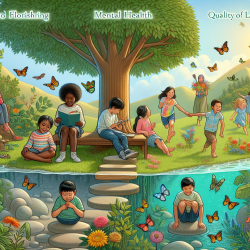Understanding the Connection Between Flourishing and Depression in Children
In the realm of child development, the concept of "flourishing" is gaining traction as a vital component of mental health. Flourishing, characterized by happiness, emotional well-being, and positive engagement, is linked to improved mental and physical quality of life. A recent study titled "The Relationship between Flourishing and Depression in Children in the U.S. Using a Socioecological Perspective" delves into how flourishing interacts with pediatric depression, offering valuable insights for practitioners.
The Socioecological Framework
The study utilized a socioecological framework, which considers the dynamic interplay between individual, family, and environmental factors. This approach helps us understand how these layers influence children's mental health. The research, based on data from the 2011–2012 National Children's Health Survey, involved 45,309 children and highlighted the significant role of socioecological factors in children's flourishing and depression.
Key Findings
- Flourishing is negatively associated with depression, meaning that children who flourish tend to experience fewer depressive symptoms.
- Parental involvement, family support, and a safe environment are crucial for children's mental health.
- Individual needs, such as physical activity and sleep quality, significantly impact depression levels.
- Environmental factors, including perceived safety and community support, also play a role in mental health outcomes.
Practical Implications for Practitioners
For practitioners, these findings underscore the importance of a holistic approach to child therapy. Here are some actionable steps:
- Encourage family involvement in children's activities to foster a supportive environment.
- Promote physical activities and ensure children get adequate sleep to improve mental health.
- Work with schools and communities to create safe and supportive environments for children.
- Consider socioecological factors when assessing and planning interventions for pediatric depression.
Encouraging Further Research
While this study provides a comprehensive overview, further research is needed to explore the nuances of how flourishing affects depression across different demographics. Practitioners are encouraged to contribute to this growing field by conducting studies that examine specific socioecological factors in diverse populations.
To read the original research paper, please follow this link: The Relationship between Flourishing and Depression in Children in the U.S. Using a Socioecological Perspective.










